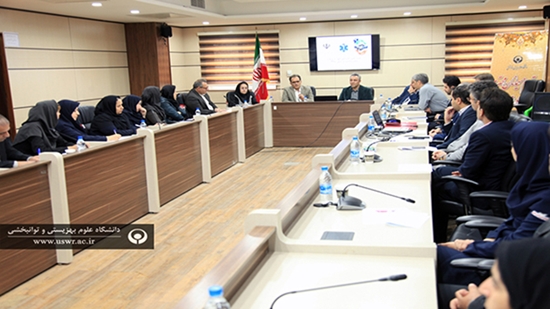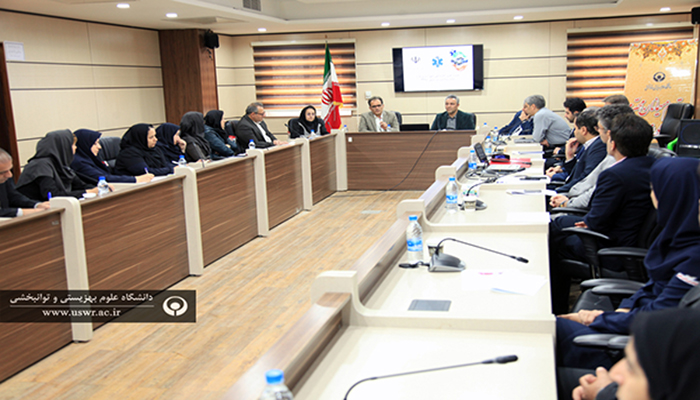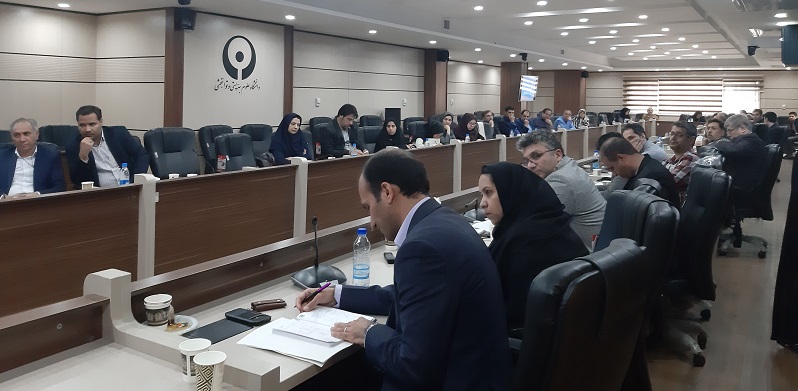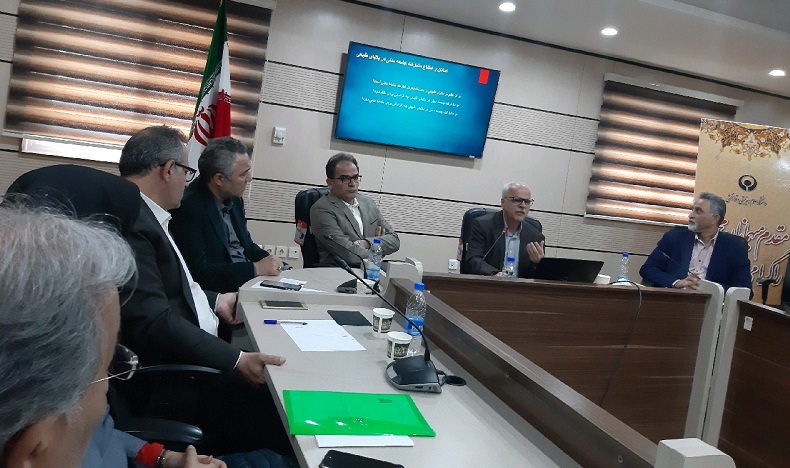Holding a specialized meeting:
Lessons Learned From Disaster Management With Emphasis On Recent Floods In Iran March and April 2019
Specialized meeting on lessons learned in managing incidents and natural disasters, with an emphasis on flood recently, with the participation of professors, academic experts and executives of health emergency events on Sunday 28 April 2019 at 9 am in the lounge Farabim of University of Social Welfare and Rehabilitation was held.


Specialized Meeting on lessons learned in managing incidents and natural disasters, with an emphasis on flood recently, with the participation of professors, academic experts and executives of health emergency events on Sunday 28 April 2019 at 9 am in the lounge Farabim of University of Social Welfare and Rehabilitation was held.
This meeting, which is a series of specialized programs for translating knowledge of the university, was created by the Education Group and the Center for Health in Emergency and Disaster Research Centre with the participation of the Social Welfare Group and the Social Work Group.
At first, Dr. Ameneh Star Faroozan, Director of Development and Evaluation of Research in the field of Research and Technology of this university, pointed out the goal of transferring knowledge and experience from the research and study in the health system is to know how much studies in health researches have been effective in providing health services and improving people's health.
Dr. Mas'ud Arab, head of the University of Social Welfare and Rehabilitation Sciences, also expressed his gratitude to the invitees and guests, pointing out that conducting meetings of knowledge transfer as a procedure in this university and holding a meeting on the topic of risk management of disasters and incidents Considering that our country is always confronting with various disasters, this consideeration is very valuable. He said "We are researching in this university in various fields, including mental health, social welfare and well-being, and post-disaster rehabilitation, as part of the development of protocols and community-based services".
In the first part of the program, Prof. Hamid Reza Khanake, the director of the group and the head of Health in Emergency and Disaster Research Centre, who was the scientific secretary overseeing this specialized meeting, delivered a lecture on the social aspects of disasters and incidents in the health system in the recent flood on March 2019. He said that in disaster risk management in Iran, social dimensions are less considered, while today the definition of disaster is moving towards social dimensions and it is said that whenever the community fails to continue its natural functions Faced with Disaster. Disaster in social aspect is an injustice and a social panic.
Prof. Khankeh said "We can not completely eliminate exposure to hazards, but we can reduce exposure," he also said, citing at least 50 percent of the country is in risk of flood and 93 percent of the earthquake risk and we encouraging this encroachment by violating the nature of the environment and construction that is not based on risk assessment. He also called vulnerability in the social dimension the most important dimension of the vulnerability, "After the flood event, in addition to the need to control the outbreak of waterborne diseases also people faced with the psychosocial problems that they lossed thier property and livelihoods and it is one of the most important damage to be taken into consideration.
Dr. Khanka, pointing out that the Islamic Republic of Iran disrupted all its assets in response to the recent flood events, despite some of the rumors that link Iran's flood to the Harp phenomenon, it should be noted that so far atmospheric phenomena have not been humiliated by human beings and, if so, created a major economic loss from natural disasters in the United States in the last two years, therfore, It is not possible. After describing the natural disaster in the world over the past 50 years, he said: "Since the 1970s, mostly weather related events have occurred, and although earthquake has been our major concern but climate change, water-related disasters and climate change is a bigger and more important concern for Iran.
In a follow up session, Dr. Behnam Saeedi, Deputy Director of the Disaster Management Organization, cites recent flood experiences. He said "One of our major issues in disaster management is cyberspace. When an disaster occurs, some of the internal factors of compassion and the support of the sovereignty and authorities, publish news and clips, which do not correspond to the reality, and will increase the dimensions of the crisis. Society and the state have grown to become celebrities and thez act gainst the expediency of the system but criticism must be compassionate and honest. Another point is that people should not pay political debts at the time of the disaster. He point out that another important factor is the lack of authority in cyberspace, a reference that observes all the news and information and addresses it correctly. We must not forget that it is necessary for us to increase the coefficient of trust of the people in the national media.
In this the meeting, Dr. Hussein Raghfar, an economist and faculty member at Al-Zahra University and Dr Saeed Madani, researcher and sociologist, also shared their experiences. Dr. Madani emphasized that serving the people in the field of crisis management should be appropriate to the conditions of society, characteristics and culture of the affected community. He said crisis management reforms required the adoption of civil society intervention, which required a change in the approach to managing the country's disaster. To this end, the involvement of the local community in planning, decision making and intervention, the capability approach and emphasis on pre-crisis and post-crisis capabilities should be considered.

Dr. Ahmed Hajabi, Director General of the Mental, Social, and Addictive Health Office of the Ministry of Health and Medical Education, described the actions and supports mental health for the affected communities, and he said: "These activities have been seriously started since 1990 and its peak was in the Bam earthquake, which is always appreciated by Dr. Yasemi. "In the first days and weeks after the disaster, we are screening people, and at least prescribing drugs," he said, pointing out that in the aftermath of mental disasters, interventions are conducted in an active way. Only in some cases a drug is prescribed that has a person with a mental illness.
He explained the principles of psychological interventions in disasters and added: "We believe in team work, not solitary. The other principle is the participation of the people and it is necessary for us to increase the mental resilience of the people and empower them."
In the end, Prof. Hamid Reza Khanka concluded with the comments and said: "Today, disaster risk management should be considered with a social approach, and an incident does not include physical damage." Social factors and factors such as age group, income level, process and distribution of wealth, education, corruption, and crisis mechanisms are also factoring that cause social problems and disruptions. Therefore, the lack of distribution of resources, the failure to consider vulnerable groups, the inappropriate consideration of culture and social conventions, the lack of single and effective crisis management and non-interventional interventions with the program can increase our vulnerability and exacerbate the impact of incidents on social dimensions.
Prof. Khankeh used the term VIP Syndrome which he revealed, "In our country, the presence of top managers at the time of the incident is known as a worthwhile, and this is one of the major problems that we must tackle. In the world, in crisis management models, the presence of senior managers at the time of the incident is not recommended except in special circumstances and should be managed by the local manager as much as possible using local resources and with the support of senior management. But in our country, if that important director does not go to the scene of the incident, he will be charged in the future.
He emphasized the need to avoid paralyzing people in response and recovery, adding, "The other thing is that everywhere in the world that is experiencing a crisis, tomorrow, people will begin to rebuild with participation, but our people depend on aid and support Are state-owned and do not have much to do with it. People need to be active at all stages of disaster risk management, from preparedness to response and retrieval, and NGOs, by attracting and enhancing social trust, ensure people's participation. Of course, this is not a leading role in risk management. It is also necessary for the government to appoint a presidential presidential candidate as head of the crisis management organization, allocate enough resources, monitor development plans and protect green space, manage water science and rivers, and monitor construction standards. The role of self-rule.



